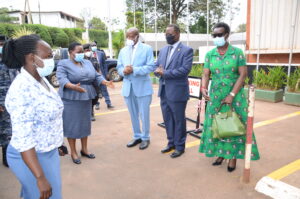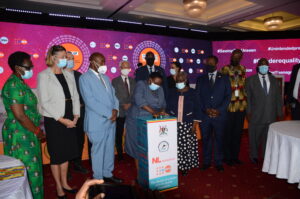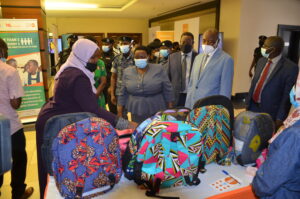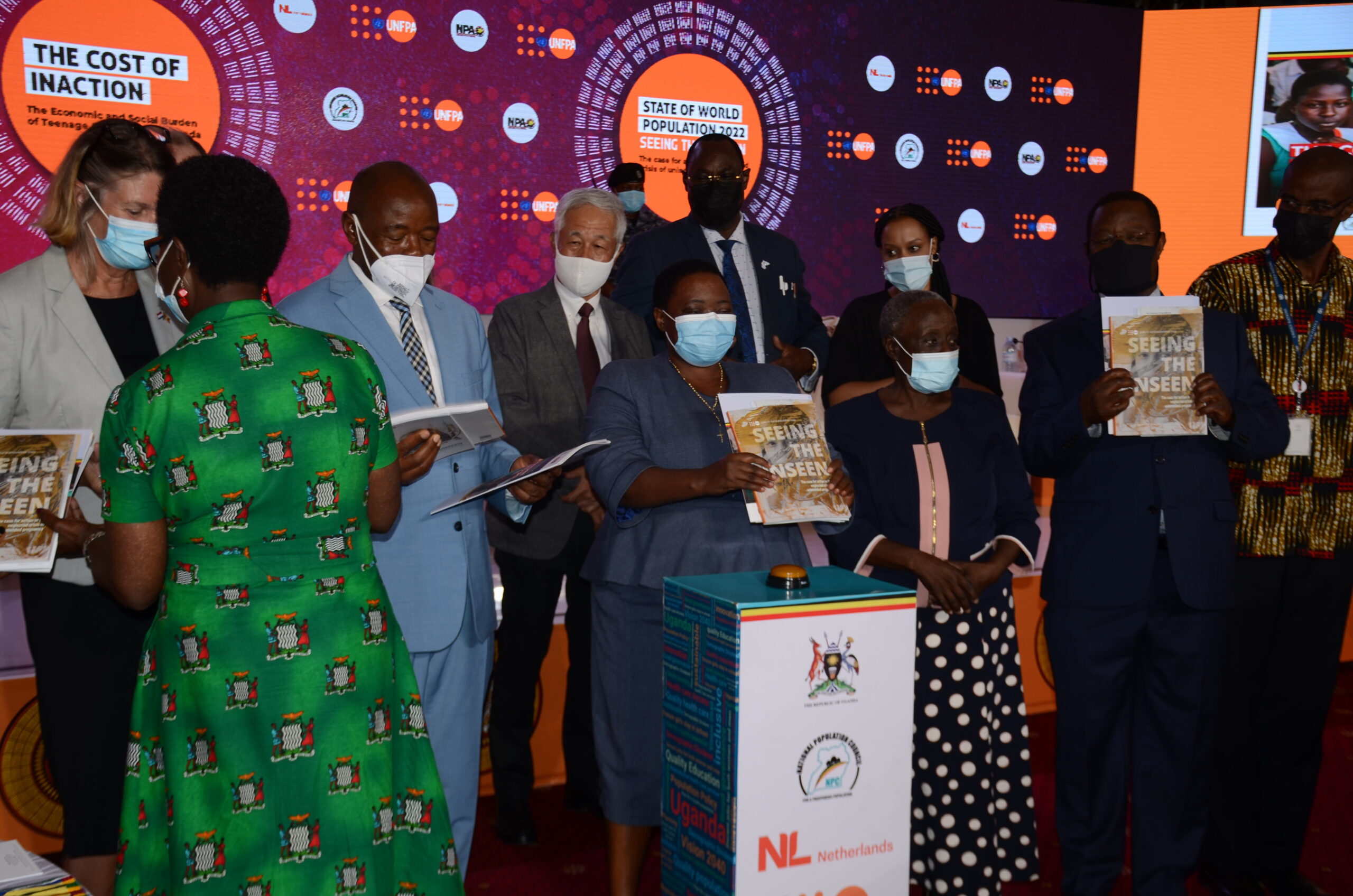By: Ismael Kasooha
KAMPALA
The Prime Minister of Uganda Rt. Hon. Robinah Nabbanja has asked all stakeholders to move from lamentations to action in addressing the increasing teenage pregnancies in the country.
Nabbanja was presiding over the launch of the two reports; one on Teenage Pregnancy, and the other, on The State of World Population at Sheraton Hotel Kampala.
“The launch of these two reports is timely as the country and the World starts to recover from the COVID-19 Pandemic and its related health and socio-economic challenges,” said Nabbanja.

The Prime Minister Rt. Hon. Nabbanja Robinah being welcomed by the Minister of State for Finance in charge Planning to the launch of the Teenage pregnancy and World population report
She said that the study on teenage pregnancies, is even timely since the national launch of the Campaign to address defilement, child marriage, and teenage pregnancy and to promote positive parenting that was launched last year.
The Premier said that Uganda has one of the youngest populations in the world, with 75% aged below 30 years.
“This young population presents both opportunities and challenges. If the right investments are made to ensure that the young people are healthy, properly educated and appropriately skilled, Uganda stands to benefit from them. If on the other hand we don’t make the right investment, we stand to lose,” said Nabbanja.
Nabbanja said that this is the reason the NRM Government led by His Excellency President Yoweri Museveni recently launched the Parish Development Model as a new game changer for improving household incomes and putting the 39 percent of our population that is currently in the subsistence economy into the money economy.
“We strongly believe that young girls from families which have some level of comfortable income can be able to resist the temptations that lead them into unsafe and unprotected sex that leads to unwanted teenage pregnancies,” Nabbanja added.
She said that even women who have an income can be able to make choices on when to have babies and ensure that they get safe pregnancies and safe deliveries.

Rt. Hon. Robinah Nabbanja launching the two reports, Teenage pregnancy in Uganda and World State of population at Kampala Sheraton Hotel
“I therefore call upon all our partners to support this Parish Development Model so that we realise our much desired goal of empowering the ordinary woman,” said Nabbanja.
She said that teenage pregnancy is a serious problem in Uganda and requires the collective action of all actors to address.
The Prime Minister said that the COVID-19 Pandemic made the situation worse with the inevitable closure of schools making our girls even more vulnerable.
“We know that the decision to close schools was made to save lives first, and in the process we got some of these consequences. We now must work together to support the girls who unfortunately got pregnant during that period,” she said.
Nabbanja said that the World Report draws our attention to the need for women to make informed decisions about their reproductive health needs and choices.
“As I have mentioned above, one of the key requirements for making these informed decisions is having an improved quality of life and money in the pocket. Poverty is a disease that prevents people, especially women, from making informed reproductive health decisions and again, the Parish Development Model provides part of the solution,” said Nabbanja.
She said that Uganda has made good progress in improving access to family planning.
The fertility rates have declined from 7.1 children per woman in the 1990’s to 5.4 as per the latest data from the Uganda Bureau of Statistics, noting that there is more work to be done, and we have to do it together.

The Ambassador of Netherlands to Uganda Her Excellency Karin Boven giving remarks at the launch of Teenage pregnancy and World Population reports at Sheraton Hotel Kampala
The Minister of State for Finance in charge of Planning, Hon. Amos Lugoloobi said that when teenage pregnancies increase, the financial burden on households also increases affecting the livelihood of the people.
“We need to step up the challenge of addressing teenage pregnancies in the country if we are to propel the economy to the desired middle income status.
He said that girls face immense pressure from both parents and the community to get married early for various reasons including culture and the need for money.
The Ambassador of Netherlands to Uganda, Her Excellency Karin Boven said that investing in girls is investing in the future.
“Teenage pregnancy is both an economic and social challenge that needs to be addressed urgently by all governments and other actors,” said Boven.

The Prime Minister inspecting exhibitions at Sheraton Hotel Kampala before launching the two reports
Facts about young people in Uganda
- One in four (25 percent) girls in Uganda aged 15-19 years have had a child or are pregnant.
- 34 percent of Ugandan girls are married by 18 years.
- 28 percent of maternal deaths occur among young girls (15-25years).
- Young people are responsible for 34% of new HIV infections annually.
- In 2021, about 32, 566 teenage girls got pregnant monthly an equivalent of 1,052 daily.
- In 2021, about 250 children aged below 15 years got pregnant monthly.
Source: UNFPA Report 2021
End





